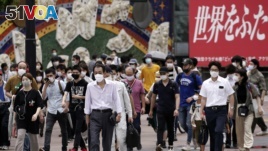03 August 2020
Japan is preparing for an increase in the number of new coronavirus infections. Recently, more than 1,000 cases were reported for two straight days in the country.
The news comes about one week after the announcement of a national travel campaign to restart the tourism industry.
National broadcaster NHK reported that the country had 1,266 new cases on Thursday. That number is higher than the old record of 1,264. The virus is spreading quickly in Tokyo and several other areas of the country.

People wearing masks against the spread of the new coronavirus walk at Shibuya pedestrian crossing in Tokyo Friday, July 31, 2020. The Japanese capital confirmed Friday more than 400 new coronavirus cases. (AP Photo/Eugene Hoshiko)
Northern Japan's Iwate prefecture was the last-remaining area free from coronavirus infection. It had its first cases recently, while the southern island of Okinawa had 44 infections, hitting record numbers for three straight days.
However, Prime Minister Shinzo Abe's government launched a national travel campaign on July 22. The goal is to restart the tourism industry and help the economy.
A member of the World Health Organization's influenza group said the campaign was not well timed. He also said it created problems for those who fear the virus, but are in need of money and business.
"I'm not going to lie, I get a bit shocked when I see that someone's visiting from far away," said Keiko Tsukahara. He is the co-manager of a small hotel in the hot springs town of Nikko, north of Tokyo.
"But we have had zero income for the past few months and we need customers," he said.
Mayor Soichiro Miyashita of the town of Mutsu, however, ordered 21 city buildings and other city-owned tourist attractions to be closed. He said health was more important than business.
The small town in northern Japan's Aomori prefecture has only one hospital, with just four beds for patients with infectious diseases. It has so far reported no COVID-19 cases.
"As we experience the second wave of cases, it shouldn't be a choice between our lives or the economy," said Miyashita.
He added that any efforts to help the tourism industry should have been started at a later time when the spread of the coronavirus has been reduced.
WHO criticizes move to reopen
The WHO panel's Norio Sugaya criticized the timing of Abe's campaign.
"I'm all for supporting the tourism industry...But we should not do that when infection is resurgent. The virus spreads as people move. This is clearly a mistake," Sugaya said.
Tokyo Governor Yuriko Koike urged shorter operating hours for restaurants that serve alcohol and bars next month to try to stop the spread of the virus.
The government will offer $1,900 to stores that agree with its request to close at 10 p.m. until August 31.
Besides urging citizens to travel around the country, Japan is also slowly opening to foreigners.
The government plans to let foreign students and workers return starting August 5, the foreign ministry said.
I'm Susan Shand.
The Reuters News Agency reported this story. Susan Shand adapted it for Learning English. Mario Ritter, Jr.was the editor.
________________________________________________________________
Words in This Story
tourism –n. related to the industry of providing services and entertainment for travelers
prefecture–n. an area of local government in certain countries, such as Japan and France
influenza –n. a common illness caused by a virus
customer –n. a person who buys goods or services from a business
resurgent –adj. becoming popular, active or successful again after a period of being less so